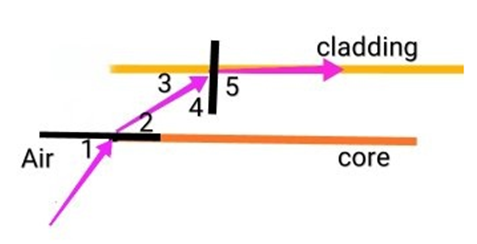 Multiple Choice Questions
Multiple Choice QuestionsAssertion: A double convex lens ( μ = 1.5 ) has focal length 10 cm. When the lens is immersed in water ( μ = 4/3 ) its focal length becomes 77 cm.
Reason:
If both assertion and reason are true and reason is the correct explanation of assertion
If both assertion and reason are true but reason is not the correct explanation of assertion
If assertion is true but reason is false
If both assertion and reason are false
The camera lens has an aperture off and the exposure time is ( 1/60) s. What will be the new exposure time if the aperture become 1.4 f ?
A point source is kept at a distance of 1000 m has an illumination I. To change the illumination to 161 the new distance should become
250 m
500 m
750 m
800 m
Assertion: Goggles have zero power.
Reason: Radius of curvature of both sides of lens is same.
If both assertion and reason are true and reason is the correct explanation of assertion
If both assertion and reason are true but reason is not the correct explanation of assertion
If assertion is true but reason is false
If both assertion and reason are false
Assertion: Optical fibres are used for telecommunication.
Reason: Optical fibres are based on the phenomenon of total internal reflection.
If both assertion and reason are true and reason is the correct explanation of assertion
If both assertion and reason are true but reason is not the correct explanation of assertion
If assertion is true but reason is false
If both assertion and reason are false
In refraction, light waves are bent on passing from one medium to the second medium, because in the second medium
the frequency is different
the coefficient of elasticity is different
the speed is different
the amplitude is smaller
A wire mesh consisting of very small squares is viewed at a distance of 8 cm through a magnifying converging lens of focal length 1O cm, kept close to the eye. The magnification produced by the lens is
5
8
10
20
A lens is made of flint glass (refractive index= 1.5). When the lens is immersed in a liquid of refractive index 1.25, the focal length
increases by a factor of 1.25
increases by a factor of 2.5
increases by a factor of 1.2
decreases by a factor of 1.2
Assertion: In optical fibre, the diameter of the core is kept small.
Reason: This smaller diameter of the core ensures that the fibre should have incident angle more than the critical angle required for total internal reflection.
If both assertion and reason are true and reason is the correct explanation of the assertion
If both assertion and reason are true but reason is not the correct explanation of the assertion
If assertion is true, but reason is false
Both assertion and reason are false statements
What should be the maximum acceptance angle at the air-core interface of an optical fibre if n1 and n2 are the refractive indices of the core and the cladding, respectively?
sin-1( n2/n1 )
sin-1
B.
sin-1
'i' is max acceptance angle (incidence angle ) air core interface which make 'r' as refraction angle ( 90° r ) as critical angle at core cladding interface making refraction angle 90°

angle 1 is i, angle 2 is r, angle 3 is r , angle is 4 is (90° r ), angle 5 is 90°
At air core interface
By snell's law
n sin i = nsin r
For air n = 1
sin i = n1 sin r
at core cladding interface
n1 sin (90° r ) = n2 sin 90°
n1 cosr =
sin i =
=
sini = n1 sinr
=
Acceptance angle = arc sin
So total internal reflection angle has to be less than Acceptance angle.
